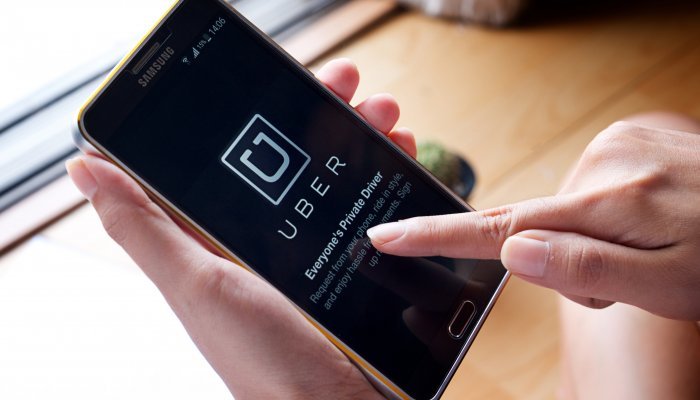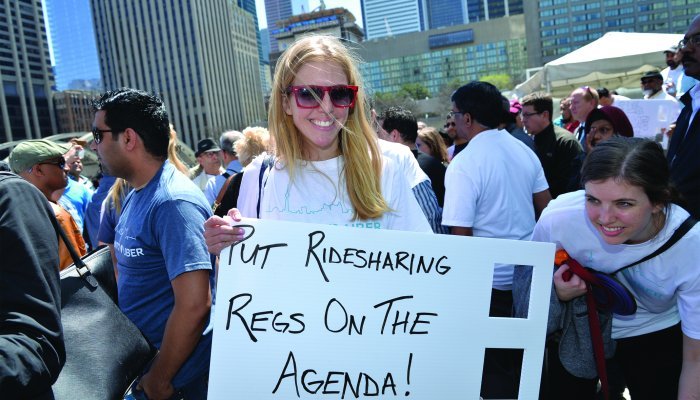As if the cut-price app-wielding transport company doesn’t have enough problems, Uber is taking a backlash from metered taxi drivers and even its so-called partners are turning against it.
For Uber, it has been remarkable growth. Since 2013, the online ride-hailing service has taken off in 12 cities in Sub-Saharan Africa with no advertising. Its disruptive nature and low prices have put its name on everyone’s lips. It connects customers through a smartphone app that tracks the journey. It also claims to look after its drivers with the PR-style promise of being CEO of their own company and working when they want in their own cars.
Little by little, this dream of dominating the taxi ranks of the world is crumbling in Africa. For a start, many drivers complain they are exploited. Angrily, they have joined the South African Transport and Allied Workers’ Union (SATAWU) and plan to take the company to the Labour Court— the antithesis of the Uber free market philosophy. That could be a stumbling block.
The dispute is — Uber takes a cut from every trip; 20% for UberX and 25% for Uber Black. Good business, bad PR.
“They take a quarter of what I make every trip. They’re treating us like rubbish. We are not even involved in the running of the business yet we are the so-called ‘driver-partners,’” says Joseph Munzvenaga, an Uber driver in Cape Town, who has been with Uber for two and a half years.
“I joined because we didn’t have to deal with cash and admin and they also promised us to be our own boss and get a chance to earn up to R10,000. We have to work long hours for little income. The cost of living is too much; we’re not benefitting anything from Uber. They just came to Africa to abuse Africans.”
Julian Wenn, another Cape Town Uber driver says exploitation by Uber is an understatement.
“When people are desperate they will do anything, when a firm like Uber has you tuned into the channel of desperation you are bound to be exploited. The sad part is most drivers still don't realize just how much they are being exploited,” he says.
Independent or not?
What may stand up in the Labour Court, for the defence, is that Uber classifies its drivers as independent contractors and not employees, hence they can avoid paying insurances and other costs companies pay to employees.
Whatever the morals of it, it’s all part of the equation that makes Uber money. According to Fortune magazine, employing drivers on full time contracts would cost Uber $4.1 billion; money Uber may not be able to recoup. For example, a metered taxi would charge R350 for a trip from Fourways to Hillbrow and Uber would charge about R100 less. This means that Uber gets more clients through its cheaper prices but drivers work more for less.
Backlash from taxi drivers is not the only problem. Uber, that built a business on word of mouth, has also found that reputations, in Africa, can be fragile.
Safety
Talk in Johannesburg right now is about an attack on a couple travelling home in an Uber from a nightclub in Sunninghill. The couple’s friend, Akshar Sewkuran, says two men were hiding in the boot and broke into the car by pushing through the back seats. The attackers got into the front, stabbed his friend and bundled his girlfriend into the boot.
“The kidnappers then took them to Tembisa, were they forced them to draw money after which they blindfolded them and tied their hands. They were then held in a house in the township where they were kept through the night and subjected my friend to random beatings through the early hours of the morning,” says Sewkuran.
The couple survived but this is merely one of the many incidents.
On July last year, another two men hid in the boot of an Uber in Fourways, north of Johannesburg, and pushed through to assault, rob and rape a 64-year-old client.
These incidents are likely to chip away at Uber’s chances of long term growth.
In Kenya, another driver, Samuel Openg, says “one day Uber will wake up and not have drivers. When you are attacked, your car is damaged and you have to pay costs when there isn’t even enough money. I know we are desperate in Africa but we will move to other ride sharing services if this persists”.
In March last year‚ an Uber driver was shot dead in his car in Cape Town. In February of the same year, another driver was attacked and his car torched in Nairobi. Uber drivers around the world have faced threats and protests from regular taxi operators, who say cheap fares from Uber drivers are driving them out of business.
More rules, please.
Safety issues aside, it’s far from simple.
In South Africa, metered-taxis are demanding a clamp down on this new kid on the block. They claim it’s operating illegally, flouting regulations and putting passengers at risk. They want it regulated or, better still, banned.
“Uber is not a very fair competitor when you come to this industry, because of their prices, they’re next to nothing. It’s actually destroying the economy of the country – that’s what they are doing,” said Lucas Seale, the spokesperson for the Gauteng Metered Taxi Operations.
In Kenya, the Taxi Cab Association called for a withdrawal of Uber, also citing the lack of regulation. The call came on the day violence also sparked, in the capital Nairobi, as taxi drivers attacked Uber drivers. The Association Organising Secretary Job Nzioka says Uber is cheaper because they are not subjected to hefty levies by authorities. Here metered taxi drivers pay a monthly inspection fee (R797), monthly parking fee (R956) and an operating fee (R1116) which Uber doesn’t.
Even Uber’s attempt to drop its prices appears to have backfired. In April, Uber dropped prices by R1 per kilometre and that provoked more violence.
“We can’t compete with these guys even if we wanted to. Their prices are very low but we can’t afford to do that as long we follow regulation. I fail to understand how they can operate freely yet they are being criminal and not paying taxes as any other regular public transport company,” says metered taxi driver Andrew Macharaira.
Global backlash
It’s not only in Africa. In Paris, cab drivers blocked the city in protest; operations were banned in Germany after a court ruled that Uber violated transport laws; in South Korea employees linked to the company were charged with running an illegal taxi firm.
Governments in Africa have shown signs that intervention could be around the corner.
South Africa’s Minister of Transport, Dipuo Peters, says given the security risks that come with E-hailing services, safety should be a priority.
“As an international company and given its experience in India and other countries, where similar occurrences happened, Uber as a company should have done better. I enjoin them to unreservedly apologise to the affected family and the people of South Africa for this unfortunate incident,” she says.
Uber spokesperson Samantha Allenberg says all drivers are independent operators and are free to work when they want.
“Uber is not a taxi nor is it a taxi or transportation company. Ridesharing apps like Uber make it affordable and more efficient for riders to get around - especially in places where there is little public transport,” says Allenberg.
Uber has had to redesign its technology to survive the tough times in Africa.
“We have announced the addition of a senior member, Deon Du Toit, to the security team as well as safety improvements for riders and drivers. In addition to the driver image, vehicle type and licence plate, riders across South Africa will see the colour of the vehicle when they request a ride…This is the first step in introducing this feature across sub-Saharan Africa and will go a long way to helping ensuring riders get in the correct vehicle with the correct driver-partner," says Allenberg.
It is also launching a trial in-vehicle SOS button in Johannesburg.
“This update will allow driver-partners to connect to a broad base of emergency services and receive advice in a critical situation. Should the pilot prove useful this feature could be introduced to the other cities across South Africa and sub-Saharan Africa,” she says.
Despite its troubles in Africa, Uber’s ambition is to be ubiquitous.
At least someone's happy
“Our ongoing conversation with regulators has also seen positive milestones in Nigeria and Ghana. We launched Uber in Lagos in 2014, and extended our reach in Nigeria in March 2016 to Abuja. This has inspired the Nigerian government to take steps towards an official approach to ridesharing, culminating in a unanimous vote by the Nigerian House in favour of a resolution supporting ridesharing.”
Allenberg says they are thrilled that Nigeria is taking steps to building ridesharing into transportation policies.
“Our launch in Ghana was underpinned by an important Statement of Understanding signed between Uber and the Ghanaian Ministry of Transport, which officially welcomed Uber in Ghana’s largest city. It is a start in producing a new, forward-looking regulatory framework that allows for ridesharing technology and regulates its use and adoption,” she says.
Although Uber has faced violence and questions over regulation, it has bigger problems to deal with.
In some parts of the continent, streets are not as well mapped. To overcome this, in Kenya, Uber is testing a pilot program with local directions startup OkHi, which uses smartphones and digital images to overcome inaccurate or non-existent postal codes, street names, or physical addresses.
Uber Africa is also following third party logistics and e-commerce delivery applications closely. Though the company has not yet introduced its UberEats or UberRUSH delivery apps in Africa, it sees unique opportunities for such amenities.
In the midst of blood and chaos, investors think that Uber will not just survive, but thrive. They have put their money to drive Uber’s valuation up to $68 billion; much higher than Facebook when it was six-year-old.
The heat may be on but Uber is playing it cool with its app.
“We can’t compete with these guys even if we wanted to”
"...all drivers are independent operators and are free to work when they want."
"...investors think that Uber will not just survive, but thrive..."







